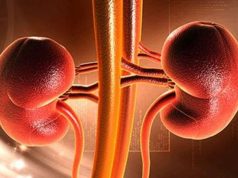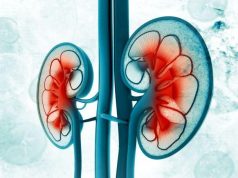The annual meeting of the American Society of Nephrology was held virtually this year from Nov. 4 to 7 and attracted participants from around the world, including nephrology specialists, researchers, scientists, and other health care professionals. The conference featured presentations focusing on the latest advances in the management of patients with kidney diseases and related disorders.
In one study, Pietro Manuel Ferraro, M.D., Ph.D., of Università Cattolica del Sacro Cuore in Milan and Brigham and Women’s Hospital in Boston, and colleagues found that certain factors predispose men to a higher risk for developing kidney stones than women.
The authors analyzed data from three large prospective U.S. cohorts: the Health Professionals Follow-up Study and the Nurses’ Health Study I and II. The final analysis included data from 268,553 adults, of whom 10,302 developed a first kidney stone over time. The researchers confirmed that gender plays a role in the development of kidney stones.
“Certain factors explain at least part of the higher risk of stones among men, including differences in waist circumference, fluid intake, and especially urine composition, [which] explained a meaningful proportion of the excess risk among men,” Ferraro said. “Since modifiable risk factors play a role in the excess risk of kidney stones among men, we can expect that vigorously tackling those factors would result in a reduction in the rate of stone formation.”
Ivonne H. Schulman, M.D., of the National Institutes of Health in Bethesda, Maryland, and colleagues found that a hospital admission with an acute kidney injury (AKI) diagnosis is an independent risk factor for multiple adverse patient outcomes within 90 days and one year after discharge for patients with and without preexisting chronic kidney disease (CKD).
The authors used a large database of claims and laboratory data for patients with private insurance to study a demographically and geographically diverse population in the United States. All AKI hospitalizations between January 2007 and September 2020 with more than two years of continuous enrollment free of AKI hospitalization were identified (594,509 patients) from the Optum database. These patients were propensity score-matched (for age, sex, race/ethnicity, preexisting CKD, and preexisting heart failure) to 594,509 control patients who were hospitalized for a non-AKI cause. The researchers found a higher cumulative incidence of all-cause rehospitalizations and death from the time of discharge to 90 days and one year after discharge in patients with a first AKI event, with or without preexisting CKD, compared with matched patients without AKI, with or without CKD.
“These findings highlight the need for early interventions to mitigate the significant morbidity and mortality burden associated with an AKI event in patients with and without CKD,” Schulman said. “While the best post-AKI clinical management regimen is yet to be determined, these results underscore the immediate need for close posthospitalization monitoring of individuals with AKI.”
Manish Sood, M.D., of the Ottawa Hospital Research Institute in Canada, and colleagues found that a new risk equation, referred to as the Kidney Disease Risk Equation (KDRE), can accurately predict the risk for developing kidney disease.
The authors used data from more than 1.1 million individuals in Ontario to develop a new risk equation that uses readily available information to identify people at high risk for developing early kidney disease. The risk equation includes age, sex, history of diabetes and/or hypertension, and laboratory test results (hemoglobin, kidney function) and can be calculated with or without a urine albuminuria test. The researchers found that the KDRE was accurate in predicting the five-year risk for developing new chronic kidney disease (CKD) defined by an estimated glomerular filtration rate less than 60 mL/min.
“The KDRE has a number of potential uses, including: (i) determining an individual patient’s CKD risk at the bedside; (ii) incorporation into existing health systems (online calculators) to identify at-risk individuals; (iii) to determine at a population level emerging CKD risk and health care planning; and (iv) as a research tool to identify high-risk patients and trial enrollment,” Sood explained.
ASN: Steroids Best Placebo in High-Risk IgA Nephropathy
TUESDAY, Nov. 16, 2021 (HealthDay News) — Steroids reduce the risk for major adverse kidney outcomes in people with high-risk immunoglobulin A nephropathy, but full-dose methylprednisolone increased the risk for serious adverse events, according to a study presented at Kidney Week, the annual meeting of the American Society of Nephrology, held virtually from Nov. 4 to 7.
ASN: Ellipsys Percutaneous Fistula Durable for Hemodialysis Access
TUESDAY, Nov. 16, 2021 (HealthDay News) — A percutaneous arteriovenous fistula created by an interventionalist in the office-based lab provides durable access for hemodialysis through five years, according to a study presented at Kidney Week, the annual meeting of the American Society of Nephrology, held virtually from Nov. 4 to 7.
ASN: PPI Use May Up Risk for AKI After Cardiac Surgery
MONDAY, Nov. 15, 2021 (HealthDay News) — Preoperative proton pump inhibitor use is associated with incident acute kidney injury in patients undergoing cardiac surgery, according to a study presented at Kidney Week, the annual meeting of the American Society of Nephrology, held virtually from Nov. 4 to 7.
ASN: Model Predicts Benefit of SGLT2 Inhibitors for Adults With T1DM
MONDAY, Nov. 15, 2021 (HealthDay News) — Treatment with sodium-glucose cotransporter 2 inhibitors could substantially reduce the risk for cardiovascular disease and end-stage kidney disease in patients with type 1 diabetes, especially those with albuminuria, according to a study presented at Kidney Week, the annual meeting of the American Society of Nephrology, held virtually from Nov. 4 to 7.
ASN: Daprodustat Noninferior to ESAs for Treating Anemia in CKD
FRIDAY, Nov. 12, 2021 (HealthDay News) — For patients with chronic kidney disease who are and are not undergoing hemodialysis, the oral hypoxia-inducible factor prolyl hydroxylase inhibitor daprodustat is noninferior to injectable erythropoiesis-stimulating agent for the treatment of anemia, according to two studies published online Nov. 5 in the New England Journal of Medicine. The research was published to coincide with Kidney Week, the annual meeting of the American Society of Nephrology, held virtually from Nov. 4 to 7.
ASN: Chlorthalidone Aids BP Control in Patients With CKD and HTN
FRIDAY, Nov. 12, 2021 (HealthDay News) — Compared with placebo, chlorthalidone therapy improves blood pressure control at 12 weeks among patients with advanced chronic kidney disease and poorly controlled hypertension, according to a study published online Nov. 5 in the New England Journal of Medicine. The research was published to coincide with Kidney Week, the annual meeting of the American Society of Nephrology, held virtually from Nov. 4 to 7.
Copyright © 2021 HealthDay. All rights reserved.








